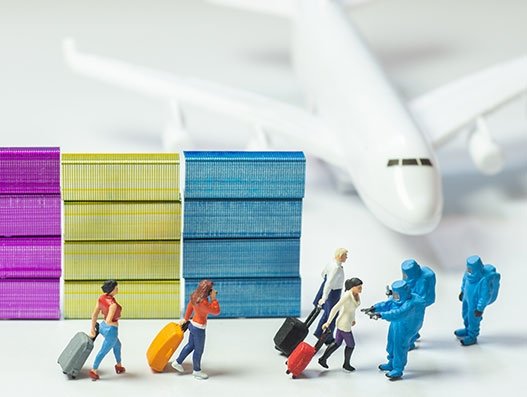
From Covid-19 Issue: The contagion has set misinformation flying
The battle against the novel coronavirus pandemic, which is ruthlessly throwing us back to the era of The Great Depression, received a war status as soon as the rumours started rapidly feeding the Covid-19 crisis, disrupting domestic and cross-border trades, creating a great pea-souper around aviation, shipping and sup

The battle against the novel coronavirus pandemic, which is ruthlessly throwing us back to the era of The Great Depression, received a war status as soon as the rumours started rapidly feeding the Covid-19 crisis, disrupting domestic and cross-border trades, creating a great pea-souper around aviation, shipping and supply chain as a whole.
On January 31, when the the novel coronavirus was clearly identified as a crisis, United States President Donald Trump claimed to have put travel bans from China. And in his Oval office address, on March 12, travel restrictions from member countries of Schengen area were also announced, which triggered a panic among airlines. And in an attempt to respond to the directives, which failed to draw attention to the exemptions for freighters and secluded passenger aircraft, airlines started working up rates for freights around scheduled flights. However, flights from Europe and China were never truly suspended.
After Trump made the announcement, Alitalia Airlines, the flag carrier of Italy, then the center of the pandemic, flew two flights from Rome’s Leonardo da Vinci International Airport to New York, which is now the center of the pandemic. Also, on Feb 24, Air China, the flag carrier of the People's Republic of China, flew its B777 from Beijing to New York's JFK Airport. The following day, Los Angeles International Airport saw flights coming from both Beijing and Shanghai.
The series of activities that contrast with the injunctions has stirred a price change around freights, putting breaks to EXIM operations, disrupting flight schedules, and changing the freight order in many countries forever.
Clearing misinformation; vital for clearing cargo
Airports serve as a hub for all stakeholders to get a glimpse into how the link in the front or at the back operates. And can be worst hit link while dealing with misinformations. A recent case of India’s one of the busiest airports, Mumbai International Airport, which is now knee deep in handling cargo operations, as the country continues to see a surge in Covid-19 cases and the airport is pushed to operate at the usual efficiency with reduced workforce, underscores the impacts of disinformation.
The primary concern at the airport amid the country lockdown has been a spread of misinformation on airline schedules among shippers, making them reluctant to clear their cargos from airport facilities. In this case, a misinformation had it that only a single airline is moving cargo in an out of the airport. “This kind of misinformation is really killing the industry. It is not allowing the shippers and consignees who are getting the cargos from overseas to make right decisions. However, we are making effort to make things clear,” said Manoj Singh, senior vice president and head cargo, Mumbai International Airport Limited. By connecting with the shippers and giving a clear picture on flight schedules, Mumbai International Airport is effectively facilitating clearance of shipments.
Ports sail through disinformation
Few of the largest ports in the United States like Port of Los Angeles and Port of Tacoma are experiencing tough time navigating the rumours, as they continue to operate at a full capacity while the country remains the hardest hit nation of all by the coronavirus pandemic.
Port of Los angles, which is also currently serving as the temporary homeport of the Naval hospital ship USNS Mercy, is facilitating the handling of critical medical supplies coming into the country and operating at 80-85 percent of capacity.
“There’s some concern and anxiety in the air, and some disgruntled sorts have spread a rumour we’re closed, but we’re moving forward, we’re moving cargo,” said Philip Sanfield, director of media relations for the Port of Los Angeles. He added, “A priority now is helping medical supply companies get their stuff.”
He declared that “All of our terminals are open,” he said. “Ships are arriving, longshore is at work, the truck community, railroad folks — everybody’s at work. We are committed to keeping the supply chain running through this crisis.”
In case of the Port of Tacoma, a similar rumour of “being closed” had been circling around to which Eric Johnson, executive director of the Port of Tacoma, in a conference call arranged by the Tacoma Chamber of Commerce in Washington state, urged businesses to refute the “rumours going around the port is closed.”
Evidently, a significant amount of resources is lost in navigating misinformation and bringing in clarity on day to day operations. Also, companies are figuring out new ways to effectively communicate with their stakeholders to keep the supply chain fluid, like giving access to online messaging groups where live information on internal trends is shared, and increasing the outflow of information on internal happenings to various media outlets.
The challenge is not in anyway novel but is seemingly affecting the global supply chain the worst and destabilising the sector. Identifying the intrinsic merit of a rumour from past pandemics and wars, one thing is clear: It’s faster than the truth.
“A lie gets halfway around the world before the truth has a chance to get its pants on” — Winston Churchill
This feature was originally published in April 2020 Covid-19 Special Issue of STAT Trade Times.

